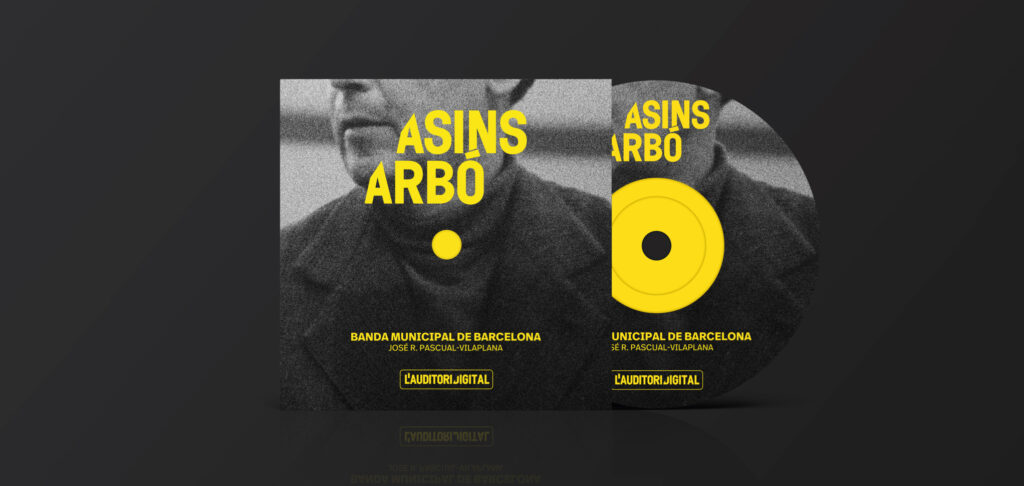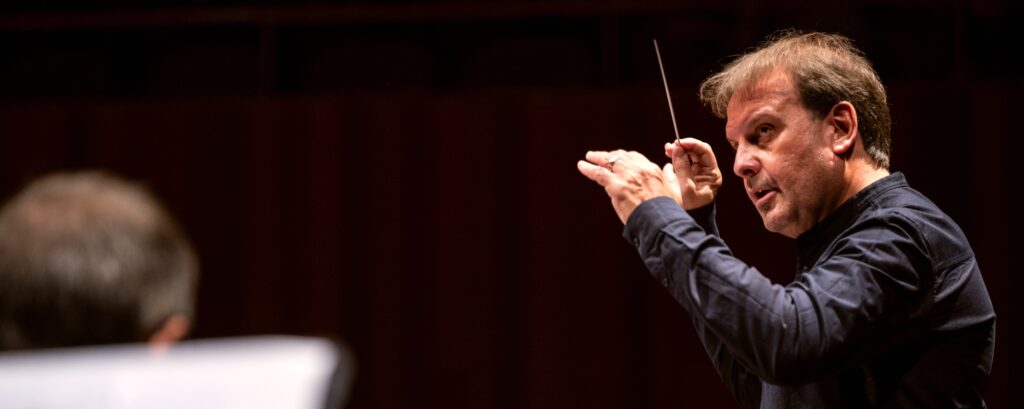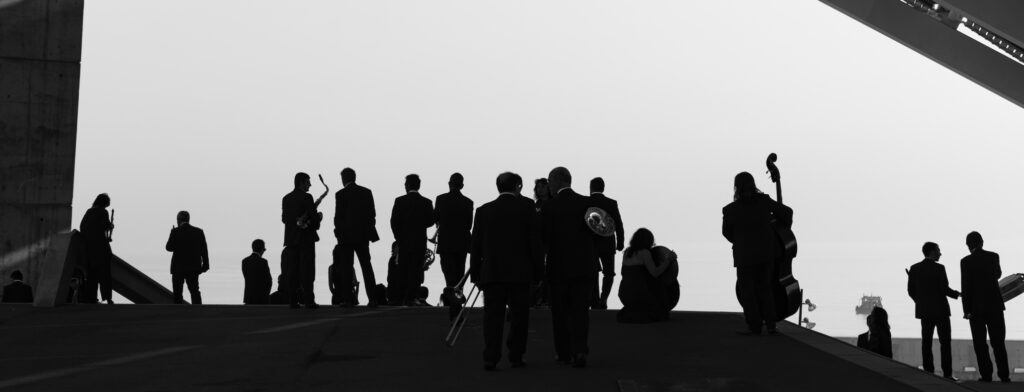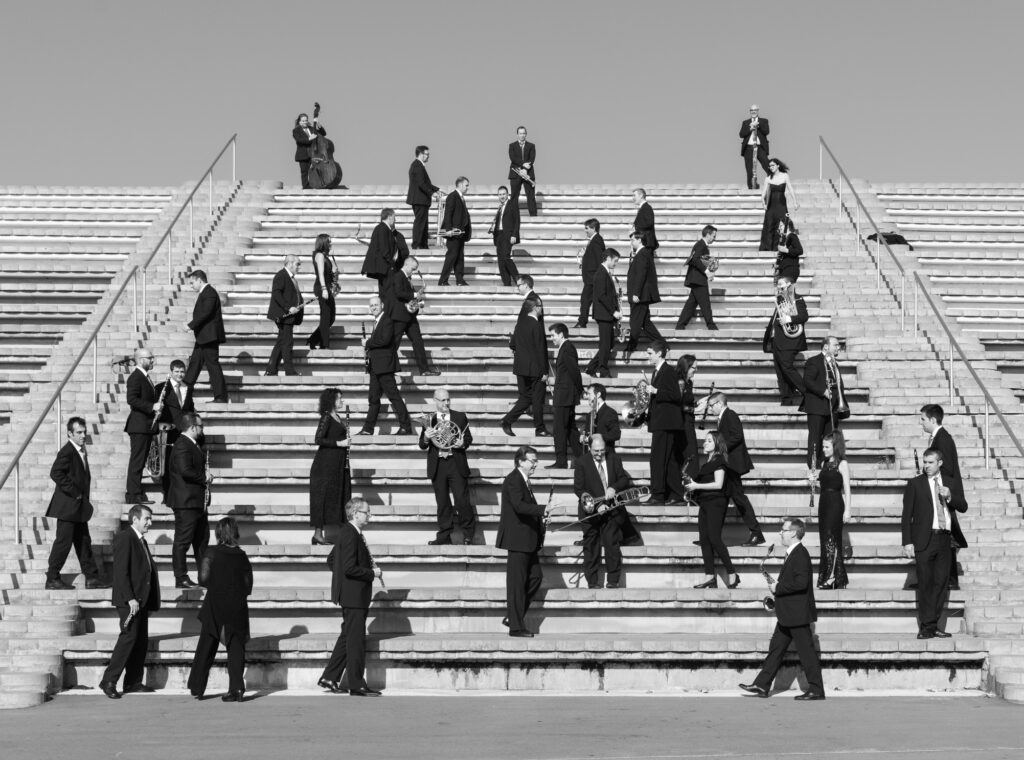
PARALLELISMS FROM BARCELONA
Texts by José R. Pascual-Vilaplana
Barcelona was born with little time difference, two important composers in whose lives, despite having no relationship with each other, we find many commonplaces in their artistic corpus, with a very close aesthetic despite developing very personal styles : Miguel Asins Arbó and Carles Suriñach. These two musical creators also agree in dedicating part of their valuable production to the world of music bands, wind and percussion orchestras to which they have been able to extract their timbre potential and have been able to place them in the a natural place of equality that corresponds to the cultivation of contemporary musical art. With this recording, the Barcelona Municipal Band wants to pay a well-deserved tribute to two artists who exported their art from Barcelona to various places and with different proposals, using the band as a vehicle for dissemination and creation.
Surinach and Asins Arbó are an example of authors committed to a territory who have been able to take advantage of these roots to take them off in their contemporaneity. His musical production is strengthened by a solid aesthetic commitment and a personal coherence of creation. Parallel times that generated similar artistic interests, as if born of a vital ecosystem where ethics and aesthetics mix.

MIGUEL ASINS ARBÓ
Miguel Asins Arbó (Barcelona, January 21, 1916 – Valencia, October 26, 1996), was born in the Hospital de Sant Pau in Barcelona and lived his first years of life in Carrer Robador in Barcelona. Son of Valencian parents, he soon returned to the city of Turia where he began his musical studies, starting with the violin, to continue composing with Pedro Sosa or Manuel Palau. In 1944 he joined the opposition National Corps of Directors of Military Music. In 1950 he obtained the National Music Award thanks to his Six Spanish songs for voice and piano. In 1954 he won the Ciutat de Barcelona Prize for his symphonic poem for orchestra, Alvargonzález. His works are premiered by directors such as Eduard Toldrà, Joan Lamote de Grignon and Ataúlfo Argenta. In 1954 he began his career as a composer of film music with the soundtrack of Rebellion, directed by José Antonio Nieves Conde. The world of cinema focused his activity to the point that he decided to move his residence to Madrid to combine his activity as a military director and as a composer for the seventh art. He participated as a music creator for films such as The stroller (1961), by Marco Ferreri, Placid (1961) o The executioner (1963) by García Berlanga, among others. He would soon also begin making music for documentaries and television series such as Diego de Acevedo (1967), Spain twentieth century (1971), Dalí (1980) o Spain at war (1986) among many more. His teaching activity was also remarkable, both as a professor at the Conservatorio Superior de Música de Madrid (1976-1986) and as a writer of methods of great relevance such as One hundred and one exercises for the practice of repentance and transportation (Real Musical, 1981), Low baroque cipher (Real Musical, 1985), Theory and practice of bass cipher in its realization to the piano (Real Musical, 1985) or The accompaniment of the melody and its improvisation on the piano (Real Musical, 1988). His connection to ethnomusicology and folklore was also clearly relevant, publishing several songbooks and writing a large number of his own compositions based on or recreated in traditional Valencian and Catalan music.
OLD AIRES OF OLD SPAIN
(1972)
With this 1972 suite, Maestro Asins Arbó won for the first time the Premio Maestro Villa de Madrid, one of the most important and historic awards in composition for band. His five movements present us with so many other rhythms typical of the Spanish folk tradition covered by the harmonious and colorful world of the master Asins Arbó, with a great stylistic eclecticism and taking advantage of the timbre resources of the most versatile band. The play was premiered by the Municipal Band of Madrid conducted by Rodrigo de Santiago, on October 21, 1973. On February 29, 1976, the Municipal Band of Barcelona conducted by the master Enrique Garcés performed this work for the first time in a concert at the city’s Congress Palace.

EIGHT CATALAN POPULAR SONGS
(1975)
The cultivation of traditional Catalan music in the production of Asins Arbó is well established with different suites for voice and piano or for choir and piano of Catalan folk songs. Instrumentally, he wrote this suite in 1976 with a version for symphony orchestra and then with a version for band. Maestro Garcés, head of the Barcelona BM, performed an instrumentation for the original orchestral band in June 1976. (SANZ, José Miguel (2009) Miguel Asins Arbó and his music for symphonic band. Valencia, Ed. Tot by Air).
Thanks to the family of the master Asins Arbó we will recover the manuscripts of the band version made by the composer himself, which lacked two of the songs (the first two) that appear in the orchestral version and that we have included with instrumentation by Pascual-Vilaplana based on the symphonic version and following the band template that the master Asins Arbó uses for the rest of the songs. We have also respected the order contained in the manuscript. Asins Arbó’s mastery is reflected in the motivic development in each song or in the textural setting that each popular melody requires for its tradition, for its lyrics, for its use.

BARCELONA SYMPHONIC BAND
JOSÉ R. PASCUAL-VILAPLANA, CONDUCTOR
CLARINETS Àngel Errea concertino, José Miguel Micó soloist, Natalia Zanón soloist, Joana Altadill, Valeria Conti, Joan Estellés, Victòria Gonzálvez, Montserrat Margalef, Manuel Martínez, Javier Olmeda, José Joaquín Sánchez, Antonio Santos, Joan Tormo, Jaume Sancho,Javier Vilaplana E-flat clarinet, Martí Guasteví alto clarinet, José Vicente Montesinos bass clarinet | SAXOPHONES Maurici Esteller soprano, Daniel Molina alto soloist, Marta Romero alto, Armand Franco tenor, José Jaime Rivera tenor, Joan Soler baritone | FLUTES Manel Reyes soloist, Paula Martínez, Carme Arrufat flute, Ana Belén Sánchez flute | OBOESE Pilar Bosque soloist, David Perpignan, Carla Suárez English corn | FAGOTS Daniel Ortuño soloist, Xavier Cervera | TRUMPETS Oleguer Bertran soloist, Carlos Lizondo soloist, Manuel Montesinos, Josep Miquel Rozalén, Miquel Zapata | TRUMPETS AND FISCORNS Jesus Munuera soloist, Patricio Soler soloist, Maurici Albàs, Santiago Gozálbez, Jesus Pascual, Javier Navasquillo, Susanna Marco | TROMBONES Emilio Bayarri soloist, Eduard Font, Francesc Ivars, Francisco Palacios low | BOMBARDINS Rubén Zuriaga soloist, David Pantín, Vicent Múñoz | TUBES Antonio Chelvi soloist, Francisco Javier Molina | TIMPANI Ferran Carceller soloist | PERCUSSIONS Mateu Caballé soloist, Ferran Armengol,Carme Garrigó,Mario Garcia,Àlex Llorens | DOUBLE BASS Antoni Cubedo, Trent Hellerstein | ARPA Laura Boschetti | PLANNING DIRECTOR Joan Xicola | EXECUTIVE COORDINATOR Susanna Gamisel | ARCHIVE Àlex Fernández | PHOTOS May Zircus | SOUND TECHNICAL ASSISTANCE Toni Vila | MUSIC PRODUCTION Markus Heiland Tritonus Musikproduktion GmbH
Album recorded from 8 to 12 July 2019 in Room 1 Pau Casals, L’Auditori de Barce
